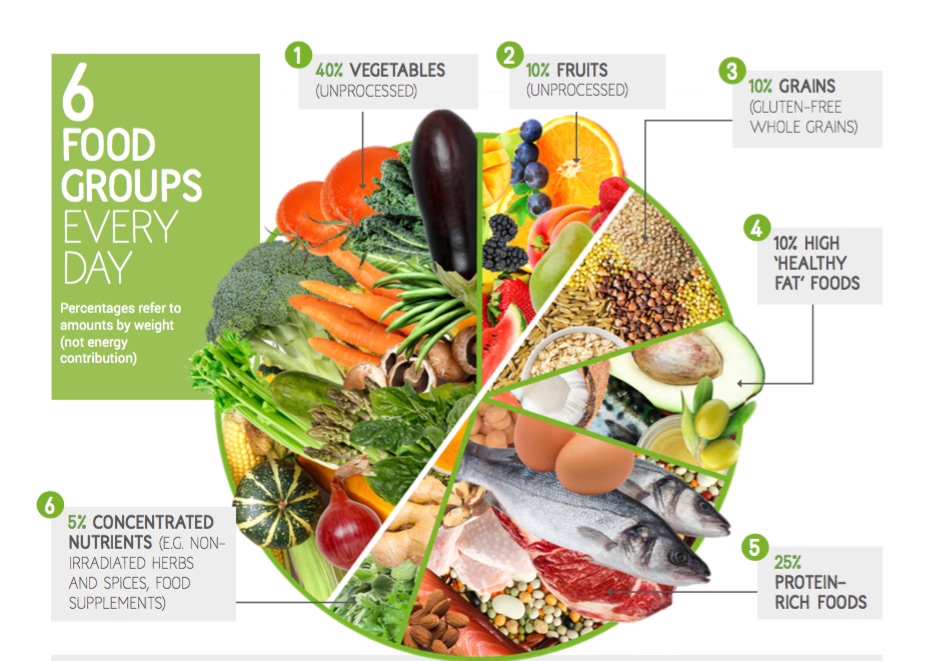Traditionally we are used to think of it as of a period of suffering. And some women actually do suffer.They experience symptoms such as hot flushes, mood swings, night sweats, osteoporosis, fast ageing, lack of energy, weight gain, headaches, dull hair, joint pain, low or totally absent libido, etc.
The first line of treatment offered by doctors is HRT – Hormone Replacement Therapy.
And while sometimes it may bring some relief, we should not forget about side effects of HRT.
Studies showed that HRT increases the risk of breast cancer, venous thromboembolism and stroke and this is enough to reconsider it and maybe try a natural approach that usually works just as well!
What could be done to have a good quality of life throughout the menopause?
Diet – a healthy diet is probably the most important factor in enabling the body to adjust automatically to hormone changes and to minimise the symptoms of menopause.
Here is the ideal plate you should be aiming for.

Eating a good amount of fresh vegetables, fruits, protein, fats and healthy grains or legumes is very important.
Legumes and fermented soya contain special compounds called isoflavones, which are phytoestrogens. In our gut they are being converted into a substances that have an oestrogenic action and it has been noticed that Asian women ( especially in Japan) who eats miso soup, soya sauce, and tempeh (all are made of fermented soya) daily , have much fewer menopausal symptoms than women in the West.
The diet high in fermented soya is also reducing risk of breast cancer at 14%.
But do not confuse ordinary soya milk which is not that healthy with fermented soya. When eat soya – always have fermented and preferable organic.
Clearspring Organic Brown Rice Miso Paste is one of my favourite and is easy to buy in supermarkets in UK and online.

Miso soup is extremely easy to make – just stir a teaspoon ( you can go up to a tablespoon) of miso paste in a cup of hot water and drink. You can also make a proper soup if you add cooked salmon flakes, seaweed (Clearspring Wakame are my favourite), boiled egg and/or rice noodles. You can also add literally any of the vegetables in there. It’s a very easy soup to make but one of the best for your health.
You can also add miso paste to any of your vegetables stir fries or make a very rich soup with veggies and chicken for example, stirring miso paste in.

Another superfood is Flaxseed.
Flaxseed is a significant source of phytoestrogens and lignans, which have estrogenic activity, meaning they act a bit like estrogen in the body and can help balance estrogen levels which will help any symptoms that are due to a drop in estrogen levels. Four tablespoons of ground flaxseeds added to daily diet could help to reduce the symptoms of the menopause.
If you wonder what food/drinks you should be avoiding – I would say coffee, alcohol and spicy food as they may worsen the symptoms.
Apart from food, supplementation is usually necessary. You need to give extra support to your body and provide key nutrients for its optimum function!
Vitamins and minerals
such as vitamin C, A, vitamins B group, vitamin D and Magnesium can help to reduce hot flushes, night sweats, anxiety, irritability and mood swings, increase energy and improve concentration. Magnesium is also important in relation to osteoporosis which often develops during menopause – it helps to metabolise Calcium and Vitamin D and to convert vitamin D into its active form needed for efficient absorption of Calcium.
Herbs
are very important too!
Sage, Hops, Red Clover and a few others help to reduce hot flushes. insomnia, irritability and night sweats and should definitely be implemented in the menopause treatment protocol.
Do not forget about exercises – they are vital for the health of our bones.
Exercise is beneficial for more than just hot flashes and more than just menopause. It can reduce hot flashes, help you lose weight, condition your muscles, improve bone density, prevent heart disease, lower cholesterol, balance moods by increasing endorphins, reduce insomnia, decrease fatigue, increase sexual desire, and improve confidence.
With respect to hot flashes, regular exercise may reduce them, but vigorous exercise may actually exacerbate them, so keep that in mind as you explore what types of exercise work best for your body.
Exercise regularly – at least 30 minutes, at least four times per week (every week!) Keep exercise moderate – not too vigorous. Include exercises that build energy internally such as Yoga, Pilates, and Tai Chi. Lessen exhausting workouts that may deplete energy such as high cardio or excessively long workouts that cause you to sweat a lot. For weight loss – increase to 60 minutes per day (every day)
Manage your stress.
It can actually be a very stressful time with the body going through so many hormonal changes. The ability to manage stress can be enhanced by meditation, yoga, breathing exercises, being out in nature, and getting regular exercise.
- Take time for yourself – even 5 minutes to relax and give your body a break throughout the day.
- Epsom salt baths just before bed can be relaxing and help get rid of stress from the day that may otherwise affect your sleep
- Get outside – fresh air, sunlight, a change of scenery, and connection with nature.
- Get enough sleep
For a private consultation please enquire through this website, I will be happy to help you!

